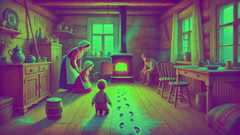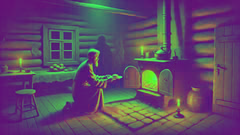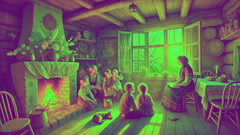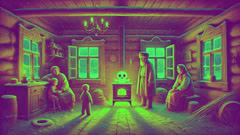Introduction
In the snow-blanketed reaches of 19th-century rural Russia, where dense forests cradle wooden villages and the wind whispers secrets through icy birch groves, every home pulses with a heartbeat older than memory. Here, the world is shaped as much by ancient stories as by the hands that till the black earth. Among the peasants and the gentry alike, tales of the Domovoi—the enigmatic household spirit—flow from hearth to hearth, shaping the fabric of family life. The Domovoi, unseen by most, is said to dwell beneath the threshold, in the warmest corner of the home, or sometimes behind the stove. Neither wholly good nor wholly ill, he is the soul of the house itself, quick to laughter or anger, protector or trickster, as the family’s conduct stirs his heart. For generations, the villagers of Zelenka have lived by the wisdom that a happy home is one where the Domovoi is kept content. And so, in a weathered log cabin at the edge of the woods, the Sokolov family holds fast to their rituals—leaving scraps of black bread by the hearth, whispering words of gratitude at dusk, sweeping floors with care so as not to disturb the spirit’s domain. Yet, even the most careful traditions can be forgotten in the press of hardship, and it is in these moments that legends come alive. For when the Sokolovs face a cruel winter and the strains of their hearts spill into anger and suspicion, the invisible bonds tying them to their guardian spirit begin to fray. Shadows stretch longer, bread grows stale, and a series of small but unsettling misfortunes hint that something is amiss. Through the struggle to restore harmony, the family must reckon with their own fears and failings, guided by omens and dreams, and perhaps—if fortune allows—by a fleeting glimpse of the Domovoi himself. This is a story of home: not just of walls and firelight, but of the subtle, magical thread that weaves together love, respect, and the mysterious presence that watches over us all.
Whispers by the Hearth
The Sokolov cottage stood at the very edge of Zelenka, its carved wooden eaves frosted with rime and its chimney exhaling curls of smoke into the pale dawn. Ivan Sokolov, the patriarch, was a tall man, broad-shouldered and weathered by years of toil. His wife, Galina, moved quietly through the rooms, her hands deft as she swept the rush-strewn floor and tended to the embers in the stove. Their two children, Misha and Yelena, chased each other in and out of the heat, their laughter echoing in corners where shadows huddled.

But not all corners were empty. In the hush before sunrise, when only Galina was awake, a faint rustling would stir near the threshold. The Domovoi—so the stories said—lived right there, curled up small as a hedgehog, watching over the home with eyes sharp as flint. The Sokolovs never saw him, not really. Sometimes Misha glimpsed a tuft of gray fur scuttling behind the woodpile, or Yelena swore she heard a tiny sigh when she left her bread crusts by the hearth. The family’s life was woven through with these small rituals: bread for the Domovoi, a pinch of salt at the threshold, careful words in the evening so as not to invite mischief.
As winter deepened, hardships pressed in on the Sokolovs. The harvest had been poor; Ivan’s back ached with the strain of splitting logs; Galina’s larder grew barer by the week. Tempers flared in the close confines of the house. A cracked mug left in the sink would spark arguments; a misplaced mitten could send Yelena to tears. Yet amidst it all, Galina clung to her traditions. She swept each night towards the door, never away from it, lest she sweep away the Domovoi’s goodwill. She whispered thanks before bed, even as her voice grew thin with worry.
One night, as frost painted ferns on the windowpanes, a string of accidents unsettled the household. Misha’s toy horse vanished from its usual shelf. The firewood stack toppled, spilling logs across the floor. The milk soured overnight, though the cellar was colder than ever. Even the family cat, Baba, hissed at shadows no one else could see. Ivan muttered that it was bad luck, but Galina’s heart thudded with old fears. She remembered her grandmother’s warning: "When a Domovoi is angered, he does not shout. He whispers his displeasure in broken things and restless dreams."
The children became wary, glancing over their shoulders when the stove groaned or a door creaked open. Yelena, wide-eyed, confessed to Galina that she’d seen tiny footprints in the flour by the hearth. Galina nodded gravely and told her daughter to leave a better offering for their unseen guest. That night, Yelena laid out a slice of honey cake and murmured an apology for her earlier quarrel with Misha. The cake was gone by morning.
Yet, as days crawled on and snow deepened, Ivan’s frustration grew. He scoffed at the rituals, calling them superstitions, and neglected to greet the empty air when he entered after a long day’s work. The air in the cottage grew thick—not just with smoke, but with tension and unease. Still, Galina persisted, coaxing her children into kindness and quietly maintaining the old customs. She sensed that their peace depended on more than bread and wood; it was stitched together by care and respect for things unseen.
The turning point arrived with a dream. Galina awoke in the deepest hour of night, heart pounding, the echo of a whispered voice fading from her mind. In her vision, she’d seen the Domovoi—not as a monster or a ghost, but as a small, bearded figure wrapped in a patchwork coat, eyes sorrowful and ancient. He stood by their hearth, shaking his head as the stove flickered low. "Harmony is the fire that warms," he’d whispered. "Without it, even a bright home grows cold."
Rising from her bed, Galina lit a candle and tiptoed to the kitchen. She swept the floor with slow, steady strokes, whispering a promise to mend what had been broken—not just cups and chairs, but the spirit of their home. She left a fresh slice of bread and a thimbleful of milk by the hearth. The next morning, the cottage felt lighter; the shadows less oppressive. For the first time in weeks, laughter returned at breakfast.
But the winter was not yet over, and the lessons of the Domovoi—like the frost on the window—would reveal themselves layer by layer.
The Shadow and the Gift
As January deepened, a hush fell over Zelenka. Snowdrifts rose to the window sills and the forest paths disappeared beneath a white hush that seemed to muffle even the wildest wolves. The Sokolovs’ world shrank to the rooms of their cottage and whatever warmth could be coaxed from the stove. Still, Ivan grew more distant, his spirits worn thin by the endless cold. He stayed out longer in the woods, seeking firewood and the comfort of solitude, while Galina worked tirelessly to keep hunger and fear at bay.

One night, Ivan returned late, his boots heavy with ice. He stomped into the house without so much as a greeting to his family—or to the Domovoi. The stove sputtered and smoked, refusing to burn bright no matter how much wood he added. In his frustration, Ivan cursed under his breath and slammed the stove door. The flame hissed and died. That night, everyone shivered as the temperature plummeted.
In the dimness before dawn, a strange chill crept through the cottage. The children woke to find their boots hidden and their mittens missing. A faint, sour smell lingered in the air. Galina’s heart twisted in her chest; she recognized these as warnings. The Domovoi’s patience was thinning.
But it wasn’t just the petty annoyances that gnawed at Galina. Ivan had changed, his temper flaring with every small misfortune. He began to scoff at Galina’s pleas for kindness and snapped at the children for making noise. The more he resisted the old ways, the more persistent the disturbances grew. Once, Yelena found her favorite doll standing upright on the stove—arms crossed, eyes facing the wall, as if in silent reproach. Another morning, Misha discovered his cherished wooden horse floating in the well, far from where he’d left it.
Galina remembered her dream and resolved to act. She sat Ivan down by the fire and told him the story of the Domovoi as her grandmother had once told her: how he was both protector and judge, how his mood shaped the fortune of the house, how respect was repaid in kind. Ivan grumbled, but something in Galina’s voice—firm and sorrowful—touched him. That night, she urged him to make a peace offering.
Reluctantly, Ivan knelt by the stove, placing a chunk of black bread and a slice of salted pork on a plate. He whispered an apology—awkward, half-hearted, but sincere enough to stir the air. As midnight approached, a faint warmth began to seep from the stove. Ivan swore he saw a small shadow flicker across the tiles, pausing just long enough to nod in his direction.
The following day, things began to change. The children found their boots neatly lined by the door. The stove burned hotter than it had in weeks, filling the cottage with steady heat. Galina baked a honey cake and left a slice by the hearth; when she checked an hour later, it was gone. Even Baba the cat purred contentedly by the stove, eyes half-closed in feline bliss.
But just as the Sokolovs began to relax, a new problem emerged. Ivan’s neighbor, old Sergei Petrovich, came knocking with bad news: strange accidents had begun in his own house. Milk spilled without cause; doors slammed themselves shut; laughter turned to bickering overnight. Sergei accused Ivan of having stolen his luck, but Galina suspected otherwise. She remembered her grandmother’s words: "When the Domovoi is unhappy, he may wander from house to house, seeking a place where he is honored."
That night, Galina dreamt again of the Domovoi. This time he stood at Sergei’s hearth, small and forlorn, shivering in a cold and loveless room. "A home is not just walls and warmth," he whispered. "It is kindness, shared and remembered." Galina woke with resolve. She gathered a loaf of bread and a jar of honey, and with Misha and Yelena at her side, braved the snow to Sergei’s cottage. She taught his family the old ways: how to greet the spirit, how to leave offerings, how to speak gently even in hardship.
Within days, peace returned to Sergei’s house. The Sokolovs, too, felt a renewed calm. Ivan became more thoughtful; he joined in the rituals, sometimes even telling stories of his own childhood encounters with things unseen. The children resumed their games, laughter ringing clear as sleigh bells.
And through it all, the Domovoi watched from his hidden corner, content with the harmony restored.
The Heart Remembers
Winter’s grip finally loosened in late March, though nights remained sharp and silvered with frost. Sap rose in the birches and the villagers emerged blinking into sunlight. The Sokolov cottage filled with new scents—melting snow, fresh-baked bread, damp earth—and with them came a sense of relief and renewal. But while most families celebrated the coming spring with feasts and songs, Galina remained watchful. She knew that the cycle of respect and neglect, kindness and carelessness, could turn as swiftly as the seasons.

Ivan grew into his new role as a father restored. He led his children on walks through the woods, showing them where snowdrops pushed through thawing ground and teaching them the old songs sung by his father before him. He taught Misha how to split wood with a single blow and showed Yelena how to braid birch bark into sturdy baskets. The family’s laughter drifted out through open windows, mingling with the calls of returning birds.
Yet one afternoon, as rain pattered on the roof and Galina prepared soup, she caught Misha scolding Yelena for dropping a spoon. The words were sharp; Yelena’s eyes filled with tears. Galina stepped in gently, reminding Misha that mistakes are part of learning and that harsh words leave longer shadows than broken spoons. That evening, she gathered her children by the hearth and shared another story—this one about a Domovoi who had lived with a proud merchant’s family in the city. The merchant was rich but miserly, his wife beautiful but cruel. Their Domovoi grew sullen and mean, hiding keys and spilling ink until their fortune crumbled and their house fell to ruin. Only when the merchant’s orphaned granddaughter returned with kindness did the Domovoi reappear, blessing her with unexpected luck.
Misha listened closely, his fingers tracing patterns in the firelight. When Galina finished, he took his sister’s hand and apologized, offering her a piece of honey cake left for the Domovoi. Yelena smiled and the air seemed to grow warmer. That night, Galina dreamed once more—this time of the Domovoi sitting cross-legged on the hearthstone, contentedly stroking Baba the cat. "Kindness," he murmured, "is the oldest magic."
The seasons turned and with them came joys and sorrows: a lean harvest followed by an abundant one, illness shadowed by recovery, quarrels soothed by laughter. Through it all, the Sokolovs kept their rituals. Every night they left bread by the hearth. On holidays, they set out honey and salt. They spoke words of thanks for warmth and shelter, for each other, and—always—for their silent guardian.
As years passed, tales of the Sokolovs’ luck and happiness spread through Zelenka. Other villagers began to revive old customs; even Sergei’s gruff son was seen leaving berries by his own threshold. And while no one ever claimed to see the Domovoi clearly, children would sometimes report catching glimpses—a flash of gray, a whisper in the chimney, a tiny footprint in spilled flour.
Galina grew older and slower, but her eyes sparkled with quiet wisdom. On cold nights, she sat by the stove, telling her grandchildren stories of the Domovoi—how he watched over them all, how harmony could be restored with a kind word or a gentle gesture. Her voice wove together memory and myth until it was impossible to say where one ended and the other began.
The cottage itself seemed to hum with contentment. The walls gleamed with polish; the stove burned bright; laughter echoed in every room. And somewhere, unseen but always present, the Domovoi kept his silent vigil—content in a house where love and respect had found their home.
Conclusion
The myth of the Domovoi endures in more than superstition or old wives’ tales—it’s stitched into the very heart of Russian home life. For the Sokolovs, the journey from hardship to harmony wasn’t marked by grand miracles, but by countless small acts of care: a loaf of bread shared, an apology spoken, a story told in the golden dusk. In respecting their unseen guardian, they learned to respect each other, finding strength in kindness and wisdom in tradition. Though the world around them changed—seasons turning, children growing—their rituals held fast, anchoring their family against the shifting winds of fate.
Perhaps that’s why, even now, when a door creaks in an empty room or a warm spot lingers by the stove long after midnight, someone will smile and whisper thanks to the Domovoi. Not out of fear, but out of gratitude—for it is love and harmony that make a house a home, and these are gifts worth honoring, whether watched over by spirits or by our own steadfast hearts.













